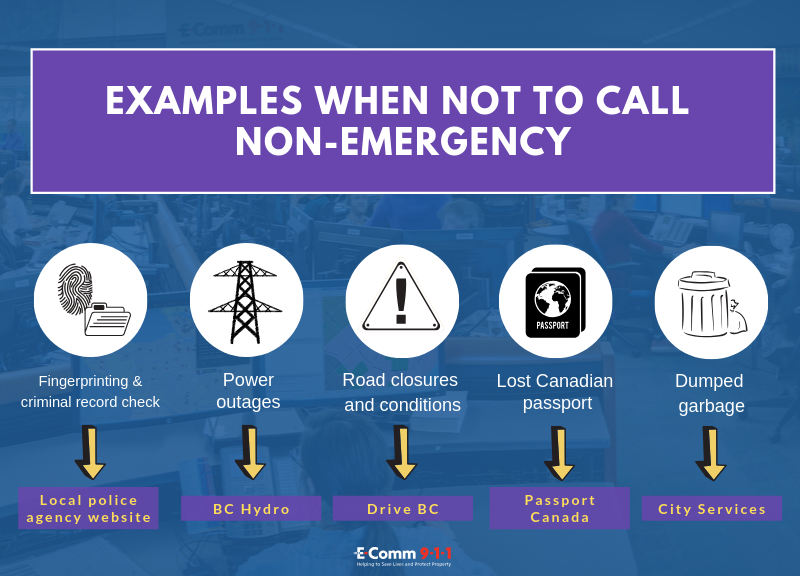
9-1-1 is for police, fire, or medical emergencies when immediate action is required: someone’s health, safety or property is in jeopardy or a crime is in progress.
If you need police assistance that is not of an emergency nature (for example, your situation is a valid police matter but does not require immediate attention), please use your local 10-digit non-emergency number. Many non-emergency matters can also be reported online, at your own convenience. Find your non-emergency number or online reporting tool here.
If you are unsure if your situation is an emergency, dial 9-1-1. Emergency call takers will help determine if immediate action is required or if you should hang-up and dial the non-emergency line.
When should I call 9-1-1?
- Whenever you—or another person’s—health, safety or property is compromised
- Domestic disputes, attacks, gunshots, fires and/or smoke, hazardous goods incidents, downed power lines, car accidents with injuries or any other medical emergency that is a threat to life or health
- An in-progress crime such as theft, break and enter or vandalism (if there is a suspect on scene) or to report an impaired driver
- A serious crime that has just occurred (sexual or other assault, robbery, child abduction)
- Suspicious activity (example: a stranger trying to open car doors)
When should I call non-emergency?
- Reporting a crime with no suspect (example: theft of a license plate or bicycle)
- Reporting a crime with suspect, but the suspect is not on the scene (example: fraud)
- Reporting a serious crime with suspect, but with a lengthy delay (example: assault that occurred “last night” at a bar)
- Non-emergency in progress (example: noisy party)
- On-going crime issues or crimes that are not in-progress (examples: graffiti or ongoing drug dealing with no suspect on scene)
- A suspicious circumstance that may indicate an ongoing criminal activity (example: suspected drug lab)
When should I call an alternate resource?
- If you suspect your car has been stolen, contact your local towing company first to ensure that it has not been impounded
- Contact ICBC if you have already left the scene of a motor vehicle incident
- Contact BC Hydro for questions regarding power outages and restoration
- Contact your local police agency during business hours for information about finger printing, criminal record checks or to request a copy of a police report
- Contact the BC Residential Tenancy Branch for questions or concerns about landlord/tenant disputes
- Contact DriveBC for general road conditions and closure questions
- Contact your local City Services for dumped garbage, parking-related complains, concerns about traffic lights or questions about local bylaws – if there is a concern for public safety call non-emergency (ie. an overgrown tree is obstructing a stop sign)
- Contact the Canadian Anti-Fraud Centre to report a scam where no money has been lost
- Contact the BCSPCA and/or Department of Fisheries and Oceans for concerns related to animals that do not cause concern for public safety (i.e. molting seals)

Tips for making your non-emergency call
- Try to report your non-emergency during the early morning or evening on a weekday to help limit your wait time
- Be ready with all relevant information when you call about your situation such as your exact address, driver’s license number or vehicle license plate number
- If you call 9-1-1 for a non-emergency matter, it will not result in a faster response as emergency operators will not take non-emergency reports on 9-1-1
- 9-1-1 call takers cannot transfer your call to the non-emergency line. You will be asked to hang-up and dial the ten-digit non-emergency number directly
Online crime reporting
- Reports of crime are not accepted over email or social media
- Some non-urgent crimes that meet a certain criteria can be reported online
- Check to see if your local police agency offers online crime reporting
Resources
- See our Emergency vs. non-emergency calls brochure for more information on when to call 9-1-1. This brochure is also available in the following languages:
Français (French), 中文 (Chinese), Tiếng Việt (Vietnamese), 한국어 (Korean), ਪੰਜਾਬੀ (Punjabi), Español (Spanish), فارسی (Farsi). - To save the non-emergency tips listed above to keep on your fridge / near a phone, download our printable information card.
- Download and print our Make the Right Call wallet card to help remember these numbers when you’re on the go. Don’t forget to write in your local police non-emergency number and check off if online reporting is available in your area.

